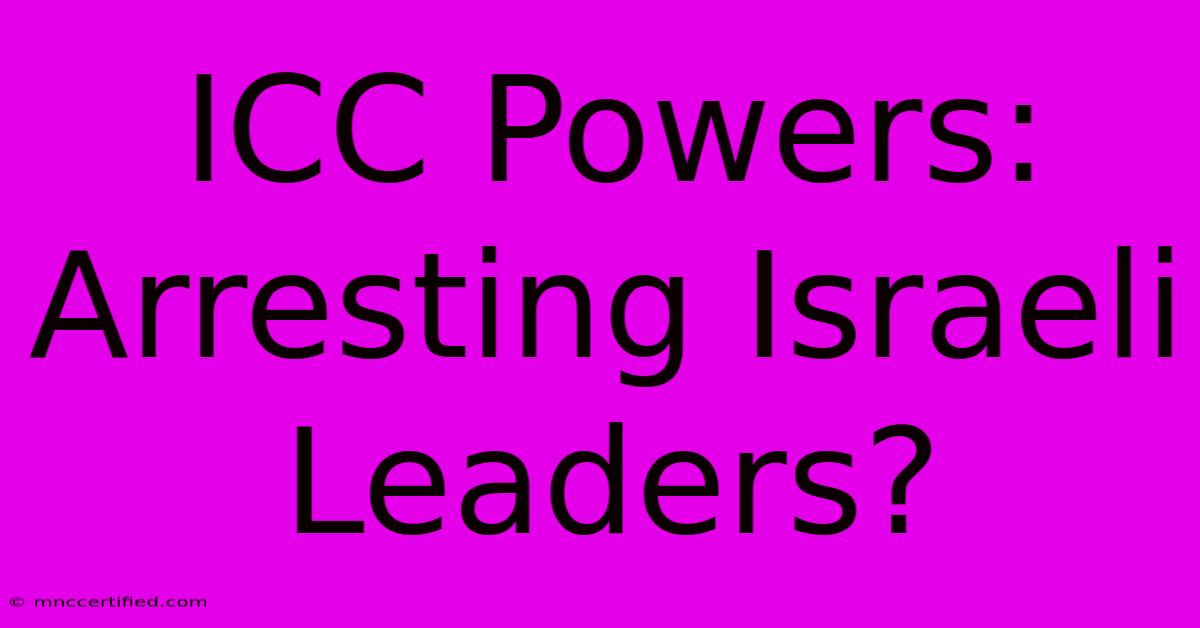ICC Powers: Arresting Israeli Leaders?

Table of Contents
ICC Powers: Arresting Israeli Leaders? The Complexities of International Justice
The International Criminal Court (ICC) has recently become embroiled in a highly contentious debate surrounding its potential to arrest Israeli leaders. This complex issue involves a delicate interplay of international law, political realities, and deeply held beliefs. Understanding the ICC's powers, the specific context of the Israeli-Palestinian conflict, and the various perspectives involved is crucial to navigating this fraught terrain.
The ICC's Mandate and Jurisdiction
The ICC's primary function is to investigate and prosecute individuals accused of the gravest crimes of international concern: genocide, crimes against humanity, war crimes, and the crime of aggression. Established under the Rome Statute, it operates independently of national jurisdictions, stepping in when states are unwilling or unable to genuinely prosecute these crimes themselves. Critically, the ICC’s jurisdiction is not unlimited. It only applies when:
- A state party to the Rome Statute refers a situation. Israel is not a state party, meaning it hasn't consented to ICC jurisdiction.
- The UN Security Council refers a situation. This path is politically challenging due to the Security Council's structure and the veto power held by permanent members.
- The Prosecutor initiates an investigation proprio motu. This involves the Prosecutor independently determining whether sufficient grounds exist to open an investigation, even without a state referral or UN Security Council resolution. This is the path the ICC has taken in relation to the Palestinian territories.
The Palestinian Territories and ICC Jurisdiction
Palestine, although not a UN member state, has declared its acceptance of the Rome Statute and is considered a "State" for the purposes of the ICC's jurisdiction, according to the Court's own determination. This declaration triggered the possibility of ICC investigations into alleged crimes committed within the Palestinian territories. Consequently, the ICC Prosecutor has opened investigations into alleged crimes committed both by Israeli forces and Palestinian armed groups.
The Israeli Perspective
Israel vehemently rejects the ICC's jurisdiction over its actions in the Palestinian territories. It argues that the ICC is biased and politically motivated, and that investigations are undermining the peace process. Israel also asserts that its actions are conducted within the framework of self-defense and are necessary to combat terrorism. Furthermore, Israel contends that the Palestinian Authority lacks the authority to submit such cases to the ICC, arguing it lacks genuine statehood.
The Palestinian Perspective
The Palestinian perspective centers on the need for international accountability for what they perceive as Israeli war crimes and crimes against humanity. They see the ICC as a vital mechanism for achieving justice and deterring future violations. The Palestinians argue that the ICC's involvement is essential to redress the power imbalance and provide a forum for addressing historical grievances and ongoing human rights abuses.
The Challenges and Implications of Arresting Israeli Leaders
The potential arrest of Israeli leaders poses numerous significant challenges:
- International Relations: Such an arrest could severely strain relations between Israel and the international community, potentially escalating tensions and undermining diplomatic efforts.
- Security Concerns: The arrest could trigger retaliatory actions, increasing the risk of violence and instability in the region.
- Legal Challenges: The legality and legitimacy of any arrest warrant would be subject to intense legal scrutiny, potentially leading to protracted legal battles.
- Political Ramifications: The political consequences of such an arrest are unpredictable, potentially impacting regional stability and international cooperation.
Conclusion: A Path Towards Justice or Escalation?
The ICC's potential to arrest Israeli leaders is a highly sensitive and complex issue with far-reaching implications. The legality, practical feasibility, and political consequences of such an action demand careful consideration. Finding a path that balances the pursuit of justice with the need for regional stability remains a significant challenge. Further dialogue, compromise, and a commitment to international law are crucial to navigating this precarious situation. The future will depend heavily on how international actors navigate these intersecting legal, political, and security challenges.

Thank you for visiting our website wich cover about ICC Powers: Arresting Israeli Leaders?. We hope the information provided has been useful to you. Feel free to contact us if you have any questions or need further assistance. See you next time and dont miss to bookmark.
Featured Posts
-
Gaetz Withdraws Bondi Nominated
Nov 22, 2024
-
Trump Assassination Trading Card
Nov 22, 2024
-
Bar And Tavern Insurance Program
Nov 22, 2024
-
An Interview With Reverend Richard Coles
Nov 22, 2024
-
Insurance Companies In Frisco Tx
Nov 22, 2024